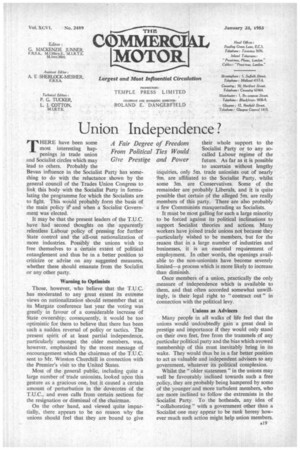Union Independence?
Page 21

If you've noticed an error in this article please click here to report it so we can fix it.
THERE have been some most interesting happenings in trade union and Socialist circles which may lead to others. Probably the Bevan influence in the Socialist Party has something to do with the reluctance . shown by the general council of the Trades Union Congress to link this body with the Socialist Party in formulating the programme for which the Socialists are to fight. This would probably form the basis of the main policy if and when a Socialist Government was elected.
It may be that the present leaders of the T.U.C. have had second thoughts on the apparently relentless Labour policy of pressing for further State control and the all-out nationalization of more industries. Possibly the unions wish to free themselves to a certain extent of political entanglement and thus be in a better position to criticize or advise on any suggested measures, whether these should emanate from the Socialist or any other party.
A Fair Degree From Political Give Prestige
Warning to Optimists Those, however, who believe that the T.U.C. has moderated to any great extent its extreme views on nationalization should remember that at its Margate conference last year the voting was greatly in favour of a considerable increase of State ownership; consequently, it would be too optimistic for them to believe that there has been such a sudden reversal of policy or tactics. The present spirit of at least partial independence, particularly amongst the older members, was, however, emphasized by the recent message of encouragement which the chairman of the T.U.C. sent to Mr. Winston Churchill in connection with the Premier's visit to the United States.
Most of the general public, including quite a large number of trade unionists, looked upon this gesture as a gracious one, but it caused a certain amount of perturbation in the dovecotes of the T.U.C., and even calls from certain sections for the resignation or dismissal of the chairrnan.
On the other hand, and viewed quite impartially, there appears to be no reason why the unions should feel that they are bound to give their whole support to the Socialist Party or to any socalled Labour regime of the future. As far as it is possible to ascertain without lengthy inquiries, only Sm. trade unionists out of nearly 9m. are affiliated to the Socialist Party, whilst some 3m. are Conservatives. Some of the remainder are probably Liberals, and it is quite possible that certain of the alleged 5m. are really members of this party. There are also probably a few Communists masquerading as Socialists.
It must be most galling for such a large minority to be forced against its political inclinations to support Socialist theories and actions. Many workers have joined trade unions not because they particularly wished to be members, but for the reason that in a large number of industries and businesses, it is an essential requirement of employment. In other words, the openings available to the non-unionists have become severely limited—a process which is more likely to increase than diminish. s Once members of a union, practically the only measure of independence which is available to them, and that often accorded somewhat unwillingly, is their legal right to "contract out" in connection with the political levy.
of Freedom Ties Would and Power
Unions as Advisers Many people in all walks of life feel that the unions would undoubtedly gain a great deal in prestige and importance if they would only stand on their own feet, free from the trammels of any particular political party and the bias which avowed membership of this must inevitably bring in its wake. They would thus be in a far better position to act as valuable and independent advisers to any government, whatever its political complexion.
Whilst the "older statesmen" in the unions may well be favourably inclined towards such a free policy, they are probably being hampered by some of the younger and more turbulent members, who are more inclined to follow the extremists in the Socialist Party. To the hotheads, any idea of " collaborating" with a government other than a Socialist one may appear to be rank heresy however much such action might help union members.
























































































































































